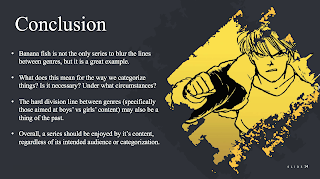Thursday, March 21, 2019
Sunday, March 3, 2019
My Brother's Husband
Since I have already read My Lesbian Experience with Loneliness
previously, I’ve decided to focus my post for this week on My Brother's Husband. Which admittedly, out of the two books
resonated with me the strongest.
My Brother’s Husband is such a
genuine and sweet story that I found to be very compelling. It is the one of
the few manga that successfully manage to portray homosexuality in an honest
light, and makes no attempt to fetishize it in any way. I love the way it
presents the relationships between the characters as they all grow together. Yaichi
especially is a very accurate representation of a person in today’s modern
world who is not technically homophobic, but is clearly uncomfortable with homosexuality,
perhaps because of it being unknown territory to him. I think it is important
that we start from that point of view and see how it gradually changes since it
is so common for people to think that way, whether they are conscious of it or
not.
I especially like how many of the
curiosities and thoughts that Yaichi has are expressed through his young daughter,
almost to show how undeveloped or naïve some of those thoughts are. This
creates a safe space for Mike to inform Yaichi, Kana, and the reader as well
about whatever curiosities they might have. The author seems to genuinely want
to educate readers of how things are like from the perspective of someone who
is part of the LGBTQ community, and doesn’t talk down on those who might be
ill-informed. The simplicity in which he presents some of it is a breath of
fresh air and truly how it should be discussed. People are just people and
should be treated no differently, no matter where their interests lie. This
book has so much heart put into it and it is truly an enjoyable read. I would
highly recommend it!
Hayao Miyazaki and Makoto Shinkai's work
The last two class periods have been really enlightening when it comes to learning more about these two very influential people and what makes their work so brilliant. Both have this way of making their work almost timeless; they tell compelling stories that can be enjoyed throughout generations. But it’s not just the storytelling that makes their work stand out from the rest, but also their eye for direction and ability to perfectly capture a moment in time and make the viewer feel as though they’re truly there, living in that moment.
It was very interesting to learn more about who Miyazaki was
as a person, and how Studio Ghibli came to be. It definitively made me
appreciate the movies more, and I was able to see them in a new light. Miyazaki
truly set the stage and standards for people to be inspired by his work and
emerge in the animation industry of Japan, such as Shinkai.
Although Shinkai is often called the “New Miyazaki” we also know
that he has very distinct nuances when it comes to his stories that are
different from Miyazaki. The types of narratives Shinkai goes back to, focusing
more on romance and communication between two characters, is not always the
concentration of Miyazaki’s stories. Even the focus on lighting in Shinkai’s
films has a unique quality to them that is easily recognizable.
Overall, I very much enjoyed both George’s and Dr. Suzuki’s presentations.
I found them very informative and eye-opening. The movies I was able to watch,
including the screening of Isao Takahata’s Pom Poko left me feeling inspired
and able to appreciate their unique visions as storytellers and filmmakers in a
new light.
Subscribe to:
Comments (Atom)

















